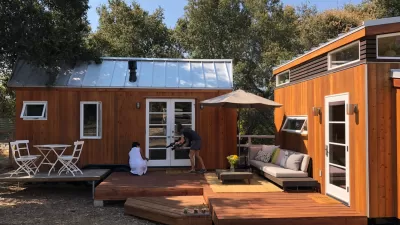Accessory Dwelling Units (ADUs) don't just help mitigate housing supply and affordability issues, they also offer significant sustainability benefits.
Margaret Morales details an under-appreciated benefit of Accessory Dwelling Units (which are sometimes known by other names, like garden suites, mother-in-law apartments, backyard cottages, or casitas). Accessory dwelling units (ADUs), argues Morales, "are a tool in the fight against climate change."
While ADUs have been commonly touted as a tool for easing the housing affordability crisis in many cities—not to mention the entire state of California, which approved ADU-enabling legislation last year—the green building angle inherent in ADU construction isn't as frequently cited.
According to Morales, "the compact size of these unassuming homes makes them remarkably energy efficient, cutting lifetime CO2 emissions by as much as 40 percent as compared with medium sized single-family homes." Moreover, "[t]hat’s far beyond the benefits of almost any other green building practice, including using green building materials, state of the art insulation, and best practices in building material waste disposal."
Morales is citing data from a 2010 Oregon Department of Environmental Quality report, which "found that a typically sized new single-family home (defined as about 2,300 square feet) built to industry standards uses nearly 60 percent more energy than a home approximately half its size [pdf[ over the course of an average 70-year home lifespan, from construction to demolition."
Morales cites all these green reasons to support and enable ADU construction as an appeal to cities and communities in the Pacific Northwest. Supply of ADUs is limited in cities like Seattle, due to regulatory hurdles, according to Morales, despite increasing interest in the option.
FULL STORY: THE FORGOTTEN GREEN HOUSING OPTION: ACCESSORY DWELLING UNITS

Planetizen Federal Action Tracker
A weekly monitor of how Trump’s orders and actions are impacting planners and planning in America.

San Francisco's School District Spent $105M To Build Affordable Housing for Teachers — And That's Just the Beginning
SFUSD joins a growing list of school districts using their land holdings to address housing affordability challenges faced by their own employees.

The Tiny, Adorable $7,000 Car Turning Japan Onto EVs
The single seat Mibot charges from a regular plug as quickly as an iPad, and is about half the price of an average EV.

Seattle's Plan for Adopting Driverless Cars
Equity, safety, accessibility and affordability are front of mind as the city prepares for robotaxis and other autonomous vehicles.

As Trump Phases Out FEMA, Is It Time to Flee the Floodplains?
With less federal funding available for disaster relief efforts, the need to relocate at-risk communities is more urgent than ever.

With Protected Lanes, 460% More People Commute by Bike
For those needing more ammo, more data proving what we already knew is here.
Urban Design for Planners 1: Software Tools
This six-course series explores essential urban design concepts using open source software and equips planners with the tools they need to participate fully in the urban design process.
Planning for Universal Design
Learn the tools for implementing Universal Design in planning regulations.
Smith Gee Studio
City of Charlotte
City of Camden Redevelopment Agency
City of Astoria
Transportation Research & Education Center (TREC) at Portland State University
US High Speed Rail Association
City of Camden Redevelopment Agency
Municipality of Princeton (NJ)





























